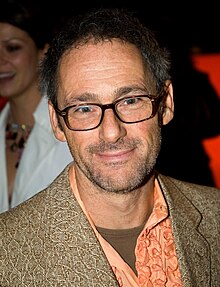Dani Levy
Dani Levy | |
|---|---|
 Levy at the 2008 Berlin International Film Festival | |
| Born | 17 November 1957 |
| Occupations |
|
| Years active | 1986–present |
Dani Levy (born 17 November 1957) is a Swiss filmmaker, theatrical director, screenwriter and actor.
Biography
Levy was born to a Jewish family in Switzerland in 1957.[1][2] His mother was a Holocaust survivor.[1] He moved to Berlin in the 1980s.[1]
Levy's films include RobbyKallePaul, I Was on Mars, Meschugge, Du mich auch and Väter. Väter starred Christiane Paul. In 2004, he directed Alles auf Zucker!, a comedy about a secularised Jew from the former GDR who has to reconcile himself with his Orthodox brother. In 2007, he directed the comedy drama Mein Führer – Die wirklich wahrste Wahrheit über Adolf Hitler, about a Jewish actor hired to enliven Adolf Hitler's speeches during the final days of World War II, starring Germans comedian Helge Schneider. It was entered into the 29th Moscow International Film Festival.[3]
Levy said he was influenced by the theory of Swiss-based psychologist Alice Miller, published in 1980, that something must have gone wrong with Hitler in his childhood. His 1995 film Stille Nacht won an Honourable Mention at the 46th Berlin International Film Festival.[4]
He is one of the founders of the German company X Filme Creative Pool.
Filmography
Director
- 1986: Du mich auch
- 1989: RobbyKallePaul
- 1991: I Was on Mars
- 1993: Ohne mich (Short)
- 1995: Stille Nacht
- 1998: Meschugge
- 1999: Das Geheimnis (Short)
- 2002: I'm the Father
- 2004: Alles auf Zucker!
- 2007: Mein Führer – Die wirklich wahrste Wahrheit über Adolf Hitler
- 2010: Life Is Too Long
- 2016: Wunderlich's World
- 2019: Berlin, I Love You
- 2020. Die Känguru-Chroniken
Actor
- 1986: Du mich auch .... Romeo
- 1989: RobbyKallePaul .... Robby
- 1991: Hausmänner .... Paul
- 1991: I Was on Mars .... Alio
- 1993: Ohne mich (Short) .... Simon Rosenthal
- 1994: Burning Life .... Neuss
- 1995: One of My Oldest Friends .... Zeto
- 1995: The Meds .... Jost
- 1995: Halbe Welt .... Katz
- 1996: Killer Condom .... Prostitute's Client
- 1996: Tempo (1996) .... Bernd
- 1998: Meschugge .... David Fish
- 1999: Aimée & Jaguar .... Fritz Borchert
- 1999: Die Hochzeitskuh .... Fleabag Hotel Concierge
- 2001: Replay .... Matthias
- 2004: Alles auf Zucker! .... Pool-Spieler (uncredited)
- 2009: Germany 09 .... Himself (segment "Joshua")
- 2010: Life Is Too Long
- 2015: The People vs. Fritz Bauer .... Chaim Cohn
- 2015: Simon sagt 'Auf Wiedersehen' zu seiner Vorhaut .... Moderator
- 2018: Sohn meines Vaters .... Karl Kaufmann
- 2019: Winter Journey .... Landlord
References
- ^ a b c Deutsche Welt: "Jewish Filmmaker Breaks Taboos with Hitler Send-Up" 27 December 2006
- ^ Fleishman, Jeffrey (17 December 2006). "A farcical attack on Hitler taboos". The Los Angeles Times. Retrieved 17 December 2006.
- ^ "29th Moscow International Film Festival (2007)". MIFF. Archived from the original on 21 April 2013. Retrieved 30 May 2013.
- ^ "Berlinale: 1996 Prize Winners". berlinale.de. Archived from the original on 30 August 2019. Retrieved 1 January 2012.
